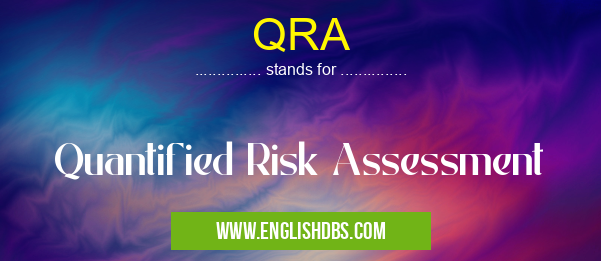What does QRA mean in UNCLASSIFIED
QRA, or Quantified Risk Assessment, is a systematic and comprehensive approach used to evaluate and quantify the potential risks associated with a particular project, activity, or system. It involves identifying potential hazards and assessing their likelihood and potential consequences. By assigning numerical values to these factors, QRA provides a structured and measurable representation of the overall risk.

QRA meaning in Unclassified in Miscellaneous
QRA mostly used in an acronym Unclassified in Category Miscellaneous that means Quantified Risk Assessment
Shorthand: QRA,
Full Form: Quantified Risk Assessment
For more information of "Quantified Risk Assessment", see the section below.
Quantified Risk Assessment (QRA): An Overview
Importance of QRA
QRA plays a crucial role in decision-making processes by providing the following benefits:
-
Risk Identification: QRA helps identify and prioritize potential risks that may not be immediately apparent.
-
Risk Quantification: It assigns numerical values to the likelihood and consequences of risks, allowing for objective comparisons.
-
Risk Prioritization: QRA enables prioritizing risks based on their severity, helping decision-makers allocate resources effectively.
-
Risk Mitigation: By quantifying risks, QRA facilitates the development of appropriate strategies to reduce or eliminate them.
-
Regulatory Compliance: QRA is often required for compliance with industry regulations and standards.
QRA Process
The QRA process typically involves the following steps:
-
Hazard Identification: Identifying potential hazards that may arise.
-
Risk Estimation: Assessing the likelihood and potential consequences of each hazard.
-
Risk Evaluation: Comparing the estimated risks against acceptable risk criteria or objectives.
-
Risk Mitigation: Developing and implementing strategies to reduce or eliminate unacceptable risks.
-
Risk Communication: Communicating the results of the QRA to stakeholders and decision-makers.
Essential Questions and Answers on Quantified Risk Assessment in "MISCELLANEOUS»UNFILED"
What is Quantified Risk Assessment (QRA)?
QRA is a systematic and structured process to identify, analyze, and quantify risks to determine their potential impact and probability of occurrence. It involves assigning numerical values to the identified risks, which allows for a more objective and data-driven assessment of risk levels.
What are the key steps involved in QRA?
QRA typically involves the following steps: 1) Hazard identification, 2) Risk analysis (qualitative and quantitative), 3) Risk evaluation, 4) Risk mitigation, and 5) Risk monitoring.
What types of risks are typically assessed using QRA?
QRA can be applied to assess a wide range of risks, including operational risks, safety risks, environmental risks, financial risks, and security risks.
How is risk quantified in QRA?
Risk is quantified using a combination of probability and consequence analysis. Probability analysis involves estimating the likelihood of a risk occurring, while consequence analysis assesses the potential impact of the risk if it occurs.
What are the benefits of using QRA?
QRA offers several benefits, such as: 1) Improved risk understanding, 2) More objective risk assessment, 3) Informed decision-making, 4) Optimized resource allocation, and 5) Enhanced risk communication.
What are the challenges associated with QRA?
Some challenges associated with QRA include: 1) Data availability and quality, 2) Uncertainty and subjectivity, 3) Complexity of analysis, 4) Resource requirements, and 5) Effective risk communication.
How can businesses and organizations effectively implement QRA?
To effectively implement QRA, businesses and organizations should: 1) Define clear objectives and scope, 2) Involve multidisciplinary teams, 3) Use appropriate tools and methodologies, 4) Ensure data quality and integrity, and 5) Continuously review and improve the QRA process.
Final Words: QRA is a powerful tool for managing risks effectively. By quantifying the potential risks associated with a project or activity, QRA provides a data-driven basis for making informed decisions and prioritizing risk mitigation strategies. It enhances risk awareness, promotes safety, and contributes to efficient resource allocation.
